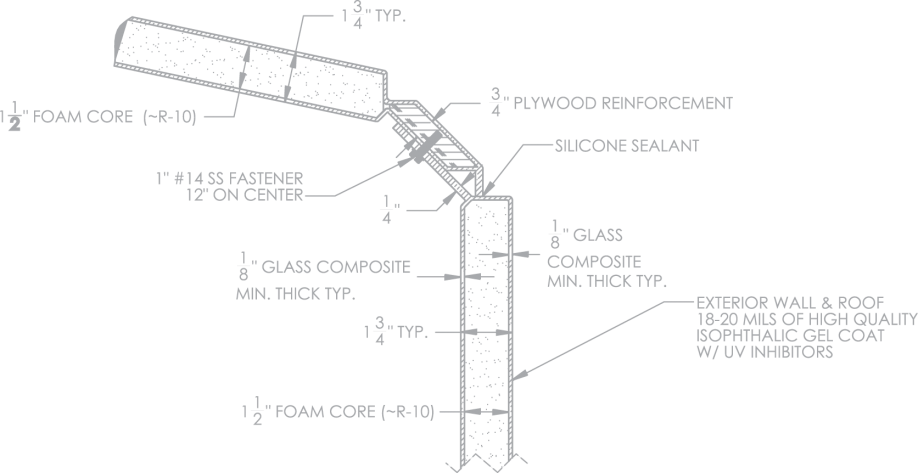Advanced Composites for Resilient and Lightweight Construction
Advanced Composites for Resilient and Lightweight Construction
Blog Article
Discovering the Uses and Advantages of Recycled Composites in Modern Industries
The amalgamation of recycled products with innovative composite technologies presents an encouraging avenue for boosting sustainability, durability, and cost-efficiency across various industries. As sectors seek ingenious services to deal with ecological issues and improve operational effectiveness, the unification of recycled compounds arises as a compelling alternative.
Environmental Benefits of Recycled Compounds
The use of recycled compounds in contemporary industries offers substantial environmental benefits, adding to the decrease of waste and the conservation of natural deposits. By including recycled compounds into producing procedures, industries can reduce their dependence on virgin products, thus minimizing the quantity of waste generated and the power required for extraction and manufacturing. This shift in the direction of using recycled composites aids in drawing away products from landfills, minimizing the worry on waste administration systems, and reducing greenhouse gas exhausts related to traditional manufacturing techniques.
Furthermore, making use of recycled compounds promotes the conservation of natural resources such as hardwood, minerals, and water, which are usually diminished with the removal and handling of basic materials (composites). By prolonging the life-span of materials via recycling, sectors can aid protect ecological communities and biodiversity by reducing the demand for new sources. Generally, the fostering of recycled composites in modern industries plays a critical function in advertising sustainability and minimizing the environmental effect of manufacturing processes
Boosted Toughness in Product Production
With a focus on long life and effectiveness, incorporating recycled compounds right into product production processes boosts durability and sustainability. By making use of recycled composites, makers can develop products that are not only solid yet likewise immune to tear and wear, making them ideal for long-lasting usage in numerous industries. The mix of various products in recycled composites can typically result in improved toughness and longevity compared to standard materials, offering an economical service for generating long-lasting items.
Among the key benefits of making use of recycled compounds in product manufacturing is the capacity to tailor the material homes to meet certain sturdiness needs. By readjusting the composition and production strategies, manufacturers can personalize the recycled composites to hold up against severe environmental problems, heavy tons, or frequent usage without jeopardizing on efficiency. This flexibility in style and production enables the development of highly resilient products that keep their integrity gradually, minimizing the requirement for constant replacements and eventually adding to an extra sustainable production process.
Cost-Effectiveness and Economic Advantages
Including recycled composites right into item manufacturing not just improves sturdiness and sustainability yet also offers considerable cost-effectiveness and economic benefits. Utilizing recycled compounds can cause lowered product costs as recycled materials are typically less costly than virgin materials. In addition, reusing composite materials can lower garbage disposal expenses and reduce the need for garbage dump room, adding to total expense financial savings for sectors.

Development and Layout Flexibility With Recycled Compounds
Utilizing recycled compounds in modern-day industries offers unequaled opportunities for innovation and design flexibility. By incorporating recycled products into composite manufacturing procedures, business can push the boundaries of standard design restraints and explore new possibilities. The flexibility of recycled compounds enables for the creation of intricate shapes and frameworks that may not be attainable with traditional products.
One of the essential benefits of recycled look at here compounds is their ability to be built into different forms, providing designers the liberty to experiment with unique forms and dimensions. composites. This adaptability opens a world of innovative chances, making it possible for the growth of lightweight yet long lasting products that meet the specific requirements of various markets
Additionally, the usage of recycled composites advertises lasting techniques and supports the round economic situation by minimizing waste and reducing the environmental look at this website influence of manufacturing procedures. This concentrate on green layout solutions lines up with the growing fad in the direction of sustainability in contemporary industries, making recycled compounds a beneficial resource for forward-thinking and innovative firms.
Applications Across Various Industries
Recycled composites locate impactful and diverse applications throughout a large range of sectors as a result of their unique buildings and sustainability advantages. In the automotive sector, these products are significantly utilized for producing sturdy and lightweight elements, enhancing gas effectiveness and lowering carbon emissions. The aerospace sector gain from recycled composites in the production of aircraft parts, where the materials' strength-to-weight proportion is important for ensuring safety and performance. In building and construction, these compounds are utilized for producing strong yet eco-friendly building products, adding to lasting framework advancement. The renewable power industry utilizes recycled composites in wind turbine blades and solar panels, harnessing their toughness and resistance to rough ecological problems. Additionally, the marine sector makes use of these materials for producing boat hulls and components, providing enhanced resilience and rust resistance. The convenience and sustainability of recycled compounds make them important throughout numerous sectors, driving development and ecological stewardship. composites.
Verdict
In final thought, the use of recycled compounds in contemporary sectors provides substantial environmental advantages, enhanced toughness in product production, cost-effectiveness, and economic benefits. Furthermore, using recycled compounds enables development and layout flexibility throughout various industries. Generally, the adoption of recycled composites presents a sustainable and practical option for fulfilling the demands of the market while additionally minimizing ecological influence.

One of the essential benefits of utilizing recycled composites in item manufacturing is the ability to customize the product properties to meet particular sturdiness demands. Using recycled composites can lead to minimized product prices as recycled materials are commonly less pricey than virgin materials. The aerospace industry advantages from recycled compounds in the manufacturing of airplane parts, where the materials' strength-to-weight proportion is crucial for ensuring safety and efficiency.
Report this page